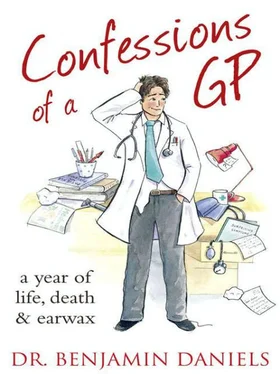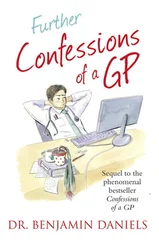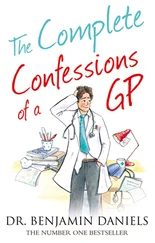It seems such a shame that racism has remained a deeply ingrained tradition of white working-class culture in certain parts of this country. Over the last 50 years or so overall prejudice has reduced and I think that the NHS has done more than any other institution to help transform racist ideas. There are a great number of different nationalities working within the NHS and has been for so many years that lots of people have had their only exposure to non-white people while going to hospital or seeing their GP. There is a story about an Indian GP who moved to a small Scottish Highlands town back in the 1960s. Initially, he and his family were met with some suspicion, but after a short period he became a much-loved member of the community and the attitudes of the local people were changed for ever.
Some people, unfortunately, are beyond help. I saw a fat middle-aged white man from the local estate who was requesting a prescription for some Viagra. He hadn’t worked for years, citing his bad back, but his real disability was his enormous gut and the deep resistance he had to getting up off his sofa. I was happy to prescribe him some Viagra but explained that it wasn’t available for free on the NHS and that he would be charged for his prescription. ‘I bet the Pakis and immigrants don’t have to pay, Doctor? You’d give me the pills for free if I was one of those asylum-seeking suicide bombers,’ he retorted. I desperately wanted to point out that, first, it was unlikely that al-Qaeda make explosive suicide belts that would fit his enormous 64-inch waist and, second, that were anyone to demand a prescription while strapped with many kilograms of high explosives then, yes, I would undoubtedly write them the prescription of their choice completely free of charge. My reasoning for this would be my natural instinct to avoid getting myself blown up rather than because of a government policy that favoured non-whites as he appeared to be suggesting. I kept my mouth shut but did take great pleasure in writing out the private prescription, knowing that this racist heap of lard would have to pay for his erections while mine still came completely free of charge.
Is not being able to sleep a medical problem? I’m not sure it is. I see lots of people telling me that they can’t sleep and they want me to give them a cure. Usually, they ask for a sleeping pill and are then surprised by my reluctance to prescribe them one. We all have nights lying awake and watching the clock slowly tick by. It’s not much fun but it strikes me as part of being human. Some people struggle more than others but usually we can find a reason for not sleeping. Causes can be divided into extrinsic and intrinsic. Extrinsic factors include having a crying baby or noisy neighbours keeping you awake. I can’t do much about those, but intrinsic factors such as stress, anxiety, excitement and pain are probably more common causes of insomnia. There is usually something keeping us awake and I always feel that there are plenty of routes to explore before we make the knee-jerk reaction of reaching for the sleeping pills.
The problem with sleeping pills is that they are addictive and stop working after a short period. The manufacturers advise that they should not be taken for more than a month, but despite this I have literally hundreds of patients who have been taking sleeping pills for up to 40 years! Benzodiazepines (benzos) are still the most commonly prescribed sleeping tablet (aka Valium, diazepam, temazepam, etc.). For those patients on these medications, stopping them is extremely difficult. My patients on Valium are like any addicts. They crave their drug and will often lie, cheat and steal to make sure they don’t miss their next dose. In the rougher parts of this country, Valium has a street value and is sold by drug-pushers along with heroin and crack cocaine. If it is viewed by dealers and junkies as an illicit drug, maybe it is time that doctors saw it in the same way.
Diazepam is a type of tranquilliser and works on specific receptors in the brain to relax muscles, relieve anxiety and cause sedation. In the short term it can seem like a wonder drug for all those angst-ridden insomniacs. The problem is the side effects. The body gradually gets accustomed to the sedative effect of the medicine and after a short period of time the drugs are no longer effective. Users start needing higher doses to have the same effect. They find that without the drug they feel increasingly anxious and unwell and can have quite severe physical side effects such as abdominal cramps, vomiting and even seizures. Taking sleeping pills at night often makes them feel slow and sluggish during the following day. I’ve had to sign people off work who were addicted to sleeping pills when they were too tired to work safely as a truck driver or machine operator during the day.
I’m not suggesting that we stop prescribing these medications altogether, as benzos do have their uses. They are valuable in calming and relaxing people prior to operations and if it wasn’t for benzos, B. A. Baracas would never have got on a plane! They can also be used to bring epileptics out of a fit and I often prescribe them when someone is under acute stress. For example, in the immediate period after a bereavement or a when a relationship has ended, a short course of diazepam can help someone to get through the first few terrible days. They are also good for patients with severe muscle spasm such as a slipped disc in the back.
I fully accept that there are drug and alcohol addicts out there. To add to those numbers many more addicts created by doctors and, principally GPs, seems such a shame. There is still a strong culture of prescribing sleeping tablets among some GPs. It is the quick fix for both patient and doctor. The patient gets a pill that makes them feel relaxed and able to sleep and the doctor gets the patient out of the room quickly. It is much tougher for both patient and doctor to try to identify the underlying cause of the sleeping problem. Depression, pain and anxiety are all difficult issues and ten minutes isn’t nearly enough time to handle them. For my patients who can’t sleep, I usually ask why they think they can’t sleep. I then move on to something called ‘sleep hygiene’ and offer advice about exercise during the day and having a hot bath and cocoa just before bedtime. I even add in a bit of feng shui and advise never to use the bedroom for anything other than as a place to sleep so that the bedroom tunes the brain into sleeping rather than thinking. Some patients like all this holistic stuff, others just want a magic pill and are disappointed when I say no.
My niece was five and for her birthday she got a pink fairy outfit that she insisted on wearing every day. The outfit came complete with a pink glittery magic wand, which, upon waving, lit up and made a ‘ didledidledidledidledeeee ’ magic wand-type sound. I would love to borrow the fairy outfit and magic wand for some of my more difficult patients…
So, Kelly. Let me summarise, you’re a 25-year-old single mum with three screaming children. You live in a cold, damp two-bedroom council flat and you’ve just had a big row with your mum and sister. It is a miserable wet day in late November and you’ve got no money for Christmas. You’ve been depressed for years and have already tried several different types of antidepressants but nothing has helped and today you’ve come to see me so that I can give you a pill to make you happy. Hold on, I’ll just get my magic wand… Didledidledidledidledeeee .
So, Mr Jackson, you’ve been having headaches everyday for 30 years. You’ve had multiple brain scans and blood tests and have been seen by three very good neurologists. A cause for your headaches has never been found and no medication has ever helped resolve them. You’ve come to see me today because you have a headache and want me to cure it… Didledidledidledidledeeee .
Читать дальше
Конец ознакомительного отрывка
Купить книгу











![Benjamin Franklin - Memoirs of Benjamin Franklin; Written by Himself. [Vol. 2 of 2]](/books/747975/benjamin-franklin-memoirs-of-benjamin-franklin-wr-thumb.webp)
![Benjamin Franklin - Memoirs of Benjamin Franklin; Written by Himself. [Vol. 1 of 2]](/books/748053/benjamin-franklin-memoirs-of-benjamin-franklin-wr-thumb.webp)